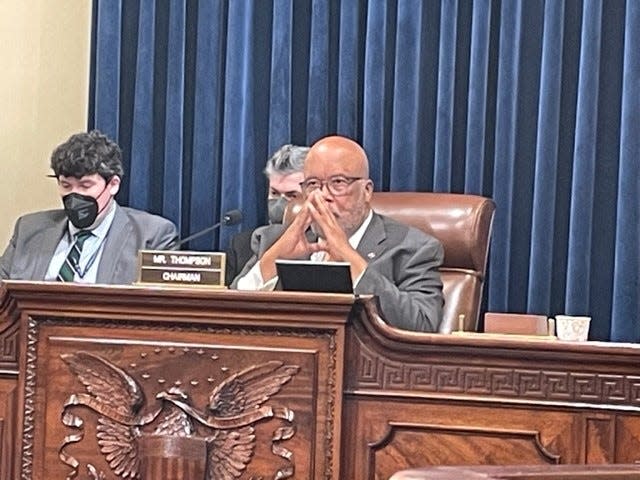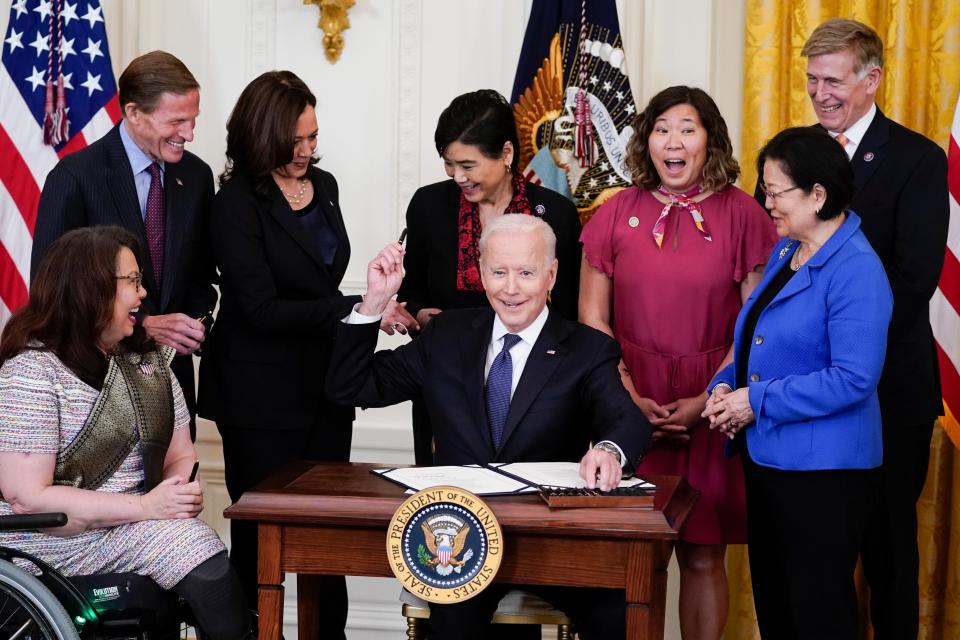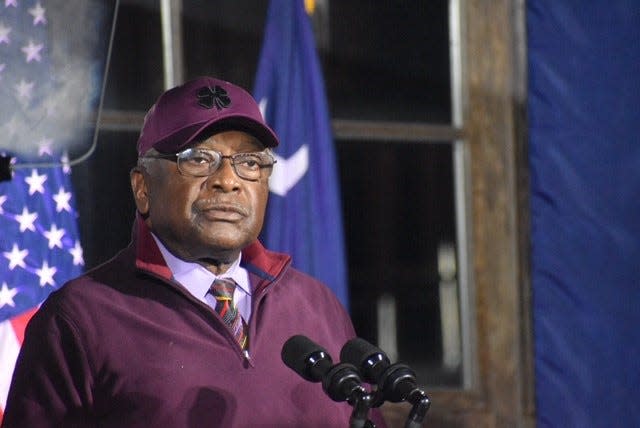Congress urged to address hate crimes, but 'hate is a hell of a motivator.' Will passing laws help?
- Oops!Something went wrong.Please try again later.
- Oops!Something went wrong.Please try again later.
WASHINGTON – For Rep. Judy Chu, the recent shooting of 10 Black shoppers in Buffalo, New York, caused a flashback to last year when eight people, six of them Asian women, were killed in the Atlanta area.
Chu was not only saddened, but frustrated that Congress hasn’t done enough to address the attacks against people of color.
“There's all this legislation sitting on the Senate side that needs to pass that could change things for the better for everybody,’’ said Chu, chairwoman of the Congressional Asian Pacific American Caucus.
She and other congressional lawmakers have railed against recent racial attacks in grocery stores, houses of worships, spas, schools and Black colleges. Lawmakers of color have called these deadly attacks often committed by extremists acts of “domestic terrorism.’’
Despite efforts by the Department of Justice to pursue more criminal charges against hate crimes and efforts by some in Congress to pass anti-hate legislation, attacks continue.
Lawmakers and experts said Congress can, and should, do more.
“It's hard to legislate hate, but in the name of public safety something needs to be done,’’ said Jason Williams, an associate professor of justice studies at Montclair State University in New Jersey.
Some lawmakers vow to continue to press for action.
"There's no way that any rational person can view all of these assaults, all of these massacres, as being anything other than the big problem that exists in this country," said House Majority Whip James Clyburn, D-S.C.

Lawmakers call for action
In the days following recent racial attacks, lawmakers often spoke out against the act, demanded action from federal agencies and law enforcement officials and proposed legislation.
Last month, the House passed the Domestic Terrorism Prevention Act that would set up domestic terrorism offices within the Justice Department, the Department of Homeland Security and the FBI. It would also require biannual reporting on the state of domestic terrorism threats.
The bill stalled in the Senate with Republicans calling it unnecessary because they said agencies already have such authorities.
“It's horrendous that it couldn't pass,'' said Chu, D-Calif. "It would have been such an important first step in addressing domestic terrorism.’’
Clyburn, who called the measure long overdue, said he and others in the House have experienced acts of racial hatred against them and witnessed domestic terrorism.
“We cannot continue to turn a blind eye to white supremacist vigilantes. It impacts all of us,’’ Clyburn, the highest ranking African American in Congress, said on the House floor last month. . “While the gunman in Buffalo was aiming for people who look like me, others who did not look like me fell victims to his evil act.’’
Rep. Ruben Gallego, a member of the Congressional Hispanic Caucus, said the House has stepped up to pass legislation, including an anti-lynching bill, but he blames Senate Republicans for blocking measures.
“That's where we're kind of missing, at least on the legislative front, some really important steps and efforts,’’ said Gallego, D-Ariz.
More than 100 Democrats signed a May 27 letter to House Democratic leaders urging them to push forward with gun violence prevention legislation.
Next week, the Senate Judiciary Committee headed by Democratic Sen. Richard Durbin of Illinois will hold a hearing called “Examining the ‘Metastasizing’ Domestic Terrorism Threat After the Buffalo Attack.”

In March, Rep. Bennie Thompson, chairman of the House Homeland Security Committee, held a hearing on threats against Black colleges and churches. Thompson, D-Miss., has repeatedly called attacks and threats against churches, mosques, synagogues and now Black colleges “acts of domestic terrorism.’’
He urged Congress to provide more grants to institutions to ramp up security.
“Statistics say the radical right-wing element in this country is still the single greatest threat,’’ Thompson told USA TODAY after the hearing. “And that threat is now manifesting itself in houses of worship and historically black colleges.’’

What is the COVID-19 Hate Crime Act?
Last month, Chu, other lawmakers and the Justice Department commemorated the one-year anniversary of the passing of the COVID-19 Hate Crime Act.
Lawmakers pressed for the legislation in the wake of rising crimes against Asian Americans and after a man killed eight people at three Atlanta-area spas in March 2021.
The law directs the Justice Department to expedite hate-crimes investigations. It also calls for the department to work with local law enforcement agencies to set up an online hate-crime reporting system and collect data.
ATLANTA SPA SHOOTING: A visual timeline of what happened
But in the past, Congress has been slow to act on anti-violence legislation.
It took more than a century for Congress to pass a bill making lynching a federal hate crime. President Joe Biden signed the Emmett Till Antilynching Act it into law in March.
After the shooting in Charleston in 2015, Democratic lawmakers proposed legislation, known as the "Charleston loophole," that would have extended the background check review to 10 days. The House passed it, but it stalled in the Senate.
Later this month, Clyburn will travel to Charleston to commemorate the seventh anniversary of the shootings at Mother Emanuel AME Church, where a white man killed nine Black churchgoers attending Bible Study. Clyburn plans to again push for action on the bill.
“That is one of the most ridiculous things in the world to say that I don't care who it is, how crazy this person may be, how deranged,'' said Clyburn. "Deranged to me is something different than being mentally ill. You can still get this gun after three days if they have not finished the background check, no matter how backlogged they may be, no matter if you give them bad information that they can't check out, you still got to sell this person the gun. Come on. I mean you got nine souls dead in Charleston because of that.''
Clyburn said the shootings in Buffalo have given the effort momentum. “The question is did it give it enough momentum?” he said.
WHAT ARE HR 8, HR 1446? Gun control bills still await Senate votes after Texas shooting

'Hate is a hell of a motivator'
Racial attacks aren’t new in the United States, but there’s been a rise in hate sentiments, experts said.
The attacks often come in cycles, said Rodney Coates, a professor of critical race and ethnic studies at Miami University in Ohio. He pointed to factors, including the COVID-19 pandemic and tensions between racial groups. He also noted the “replacement theory’’ which he said is “fanning the flames of anxieties of whites.”
Coates said those factors have been used to fuel division, particularly in elections.
“Hate is a hell of a motivator for not only politics, but also religion,’’ Coates said.
Attacks against Asian Americans spiked during the pandemic when some blamed them for the spread. There have been more than 11,000 anti-Asian hate incidents reported since March of 2020, said Chu.
Williams of Montclair State University said the far right has been more emboldened after a jury in 2021 found Kyle Rittenhouse not guilty after he shot and killed two men and wounded another during protests in Wisconsin.
Much like in the past, said Williams, there doesn’t seem to be enough urgency to address racialized attacks.
“Black life has always been rendered cheap in the eyes of our society and then in the eyes of policy makers and it pains me to have to say on both sides,’’ he said.

States urged to adopt anti-hate crime bills
However, experts said passing laws aren’t always enough.
“We have an abundance of laws on the books,’’ said Coates. “On the one hand bringing a gun and killing folks is against the law. I don't care where it happens, it's against the law.''
He said there can be more efforts to tighten background checks and change the age eligibility requirements to get a gun.
And while some states, like Illinois and New York, have tougher gun laws Coates said federal laws could impose more restrictions. The “hodgepodge’’ of state laws are inconsistent, he said.
Gallego said the Justice Department should focus more resources on domestic terrorism.
“It's also important that politicians tone down their rhetoric when it comes to issues of race and realize that they could easily weaponize an issue to the point where it causes people to go and do such extremes as what happened in Buffalo and El Paso,’’ Gallego said.
In 2019, 23 people were killed in a racist attack at a Walmart in El Paso, Texas.
Experts said there should also be more pressure on states to adopt anti-hate crime measures.
“We know that we're facing gridlock in Washington so it's really about what we can do now at the state level,’’ said Williams.
To counter some of the hate, CAPAC is pushing for more Asian American history to be taught in schools. The House recently passed a bill proposed by Rep. Grace Meng, D-N.Y., that would set up a commission to study the feasibility of creating a national Asian Pacific American museum.
And later this month, a portrait of the late Rep. Patsy Mink, the first women of color in the House and the first Asian American women elected to Congress, will be unveiled at the Capitol.
“Having better understanding of not only the struggles that Asian Americans face, but also the contributions that Asian Americans have made will in the long run create better relations between people,’’ said Chu.
ATLANTA SPA MURDERS: 'What's going to change?' Asian Americans still recovering

Using the bully pulpit
Williams, meanwhile, said lawmakers of color could use their bully pulpit more to demand action and host summits to keep the spotlight on racial attacks.
After the murder of George Floyd in 2020, there was momentum around police reforms and other changes, but that seemed to die down, Williams said.
“What's stopping them from writing more op-eds on these issues?’’ he said. “It’s easy to blame the counterparts and say that they're putting up these brick walls. ... Black legislators across the board, federal and state, I don't think they do enough. Or maybe it's just simply that they don't understand the power of the bully pulpit.”
Chu, who led a congressional delegation to Atlanta after the shootings, said her caucus, community leaders and others will continue to push for congressional action.
“You can make the situation better if you do pass these laws,’’ she said. “It doesn't mean that you stop hatred from happening, but you can prevent a lot of it by creating greater understanding.”
Contributing Bart Jansen and Ledyard King
Follow Deborah Berry on Twitter: @dberrygannett
This article originally appeared on USA TODAY: Hate crimes rise in US: Is Congress working to curb the gun violence?

